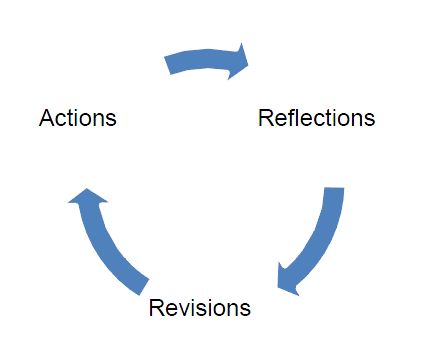Supporting and assessing online communications with Faculty of Education graduate students at Nipissing University
Opportunity
Since his initial experiences at the University of Lethbridge in Alberta in 2000, Professor Thomas Ryan has been using online and connected learning to teach and engage students in faculties of education. Now at Nipissing University in North Bay, Professor Ryan is designing and teaching online courses offered to students at the master’s and doctoral levels.
Innovation
In developing and supporting communities of learners in online courses, Dr. Ryan pays particular attention in his course design, teaching, and research to discussion boards and to project assessments that involve peer and self assessments.
Discussion boards are important components of the online courses and students need exemplars and encouragement to understand the precision and clarity of language required for good posts, as well as clear standards for online discussion. All of this requires the direct online presence of the instructor. Dr. Ryan provides a rubric to specify expectations for contributions to discussion boards that includes examples of good, adequate and inadequate posts to illustrate the importance of providing actual content while moving a discussion forward. Contributions that reflect content from the textbook and the related literature, as well as stylistically correct American Psychological Association (APA) citations, are essential characteristics of good posts.
Participation in discussion boards supplies about 25% of the grade in Dr. Ryan’s courses, as students demonstrate that they are part of the community of learners through the presentation and refinement of their beliefs, points and counterpoints, experiences, and questions. If students are not participating frequently enough or in a timely manner or not submitting quality posts, Dr. Ryan contacts them individually through e-mail to discuss performance.
Factors in the assessment of posts include:
The number and timing of the posts;
The level of participation;
Response to points raised in the discussion in terms of bringing in new information; and
Reflection on, and response, to the posts of other students.
As part of creating a positive community of learners, he will also eliminate posts that are too provocative or inappropriate and inform the student of his action. The concern is not the avoidance of sensitive issues but forms of expression within institutional guidelines.
Using the BlackBoard Learn learning management system, analytics on student online behaviour can be shaped into a profile that allows quantitative measures to be examined for each learner and the entire class.
Among the criteria that Dr. Ryan provides to students concerning online communication in discussion boards are:
Minimum levels of expectations for communications;
Times and frequency of posts as some students prefer to post only once on any given topic, whereas continuous participation is necessary for better learning;
Policy for posts in terms of content, professionalism, acceptable behaviour online; and
Exemplars of both quality and not-so-good posts.
More detail on this can be found in Dr. Ryan’s recent paper in Education across Time and Space (page 118).

In the second stage, each student chooses a peer who uses the same criteria to do an evaluation. Professor Ryan then considers both the self and the peer assessments, does his own criteria-based analysis of the work, and compares it to the work that each student has done in the past to provide an assessment that includes more than the professor’s opinion in assigning a grade. Peer evaluation is not used for evaluation of posts; Dr. Ryan has tried this but has found that the peer evaluations of posts can potentially be personal rather than professional.
Outcomes and Benefits
The student-centred nature of online learning facilitates the development of communities of learners that function both inside and outside of class. The class exchanges are built around group work and student-led facilitated discussions online, structured to fit an asynchronous environment. Supplementing the in-class experiences, students discover shared research interests and exchange links and points of view.
Over the 13-week span of the course, students may encounter difficulties in their professional or personal lives that limit their participation. As the material remains online, the student can come back into the class and still have access to the resources and participate in the discussions, a situation that is impossible with a face-to-face class.
Challenges and Enhancements
In Dr. Ryan’s experience, designing an online course takes about twice as much time as a course to be delivered face-to-face. While the course is being offered, students have expectations of the instructor that include 24 hour availability and instant response. As he describes it, “there is always something to do when you go to the computer”, whether this is student communication, course revision, the addition of a course notice or announcement, etc.
The initial expectation was that all students at the masters level would prefer the flexibility of the online courses. However, experience and research have shown that about 4 out of 10 students prefer face-to-face classes.
Potential
Having recently attended international conferences on online learning, Dr. Ryan describes online learning in the future as even more pervasive, mobile, and accessible when, how, and wherever a learner wants it. It may even reach a capacity for hologram-type screens that will convey not only audio and video, but even sounds and smells that would make the experience even more realistic.
Nipissing University is introducing a PhD program in Education and Sustainability that will be entirely online with the exception of two summer residencies. This scale of development indicates that online learning is enhancing the scope and the reach of post-secondary education.
A book Dr. Ryan co-edited has recently (2014) been published, Teaching Online: Stories from Within, and is available from Common Ground Publishing.
For Further Information
Dr. Thomas Ryan
Professor
Faculty of Education
Graduate Studies
Nipissing University
North Bay
[email protected]


